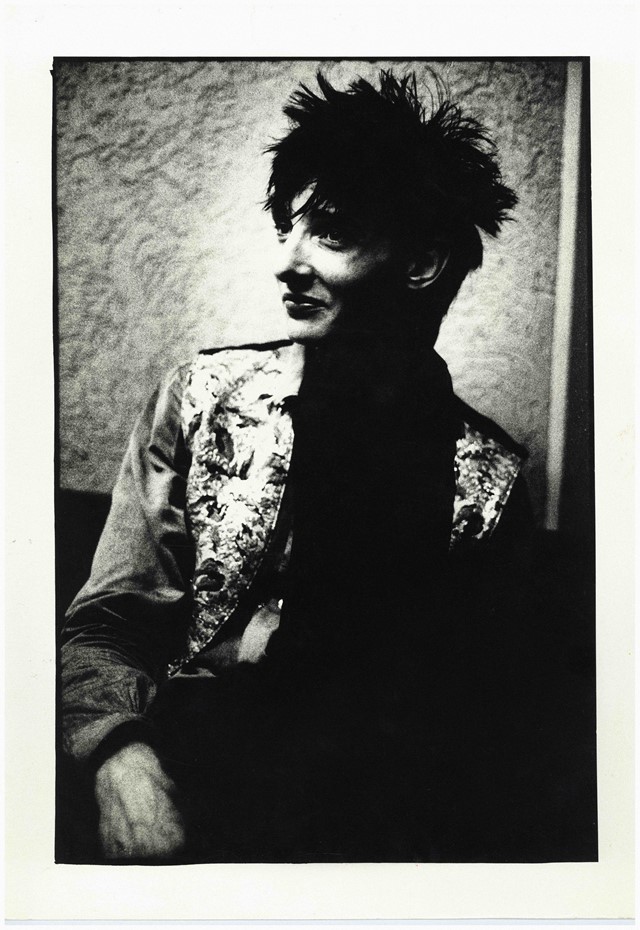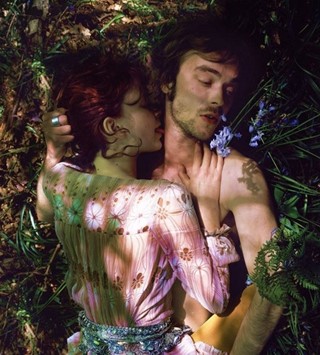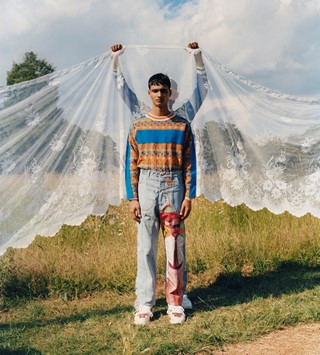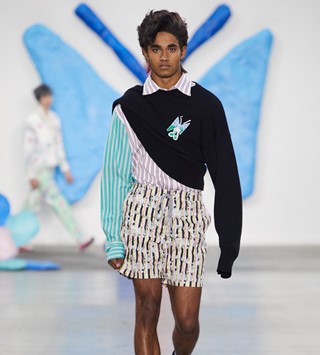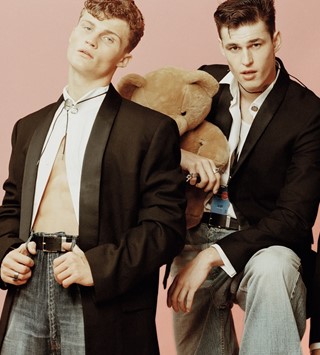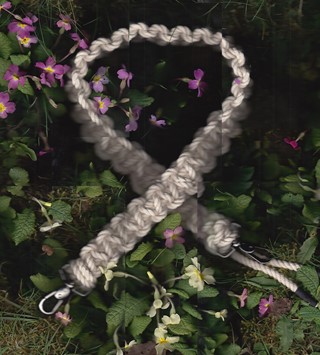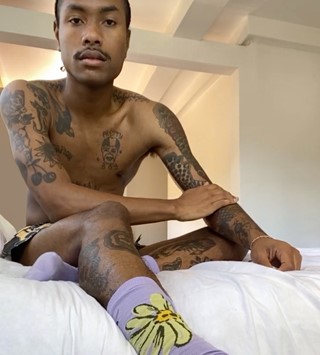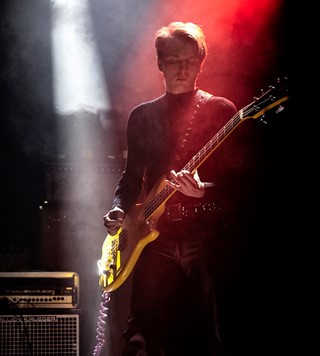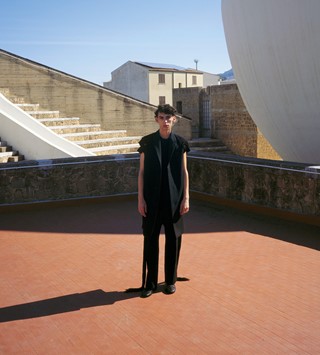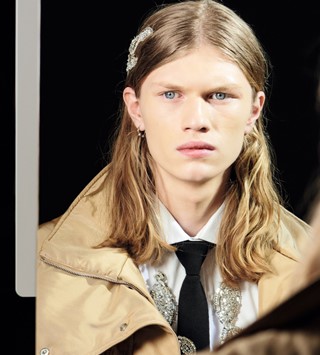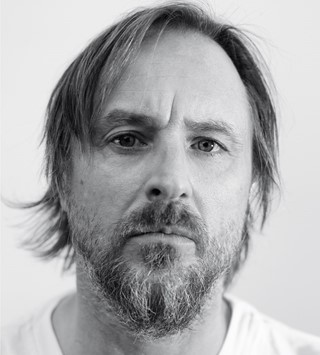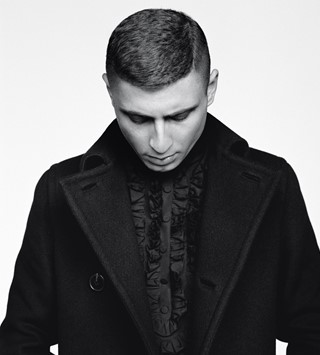Thurston Moore, Lydia Lunch and More Remember Rowland S Howard
- TextShaun Curran
As Mute reissues his heart-piercing solo albums, friends, family and colleagues remember the musician’s life and career
Rowland S Howard was the precocious talent of the Australian post-punk scene. A slender dandy with high ideals, Howard’s white light guitar soundscapes with Melbourne’s riotous malcontents The Birthday Party – an urgent, abstract hybrid of distorted Americana twang, needle-sharp blues riffs and scorched-earth feedback – blazed a new trail for rock music.
After the messy dissolution of The Birthday Party in 1983, a life of heroin addiction hindered his creative output in the years until his premature death in 2009 from liver cancer, aged just 50. But his idiosyncratic work with The Boys Next Door, The Birthday Party, Crime and the City Solution, These Immortal Souls, Lydia Lunch and, finally, on his two solo albums, have long been revered in the esoteric recesses of the alt-rock community. His most famous composition Shivers, a beautiful mock-paean to teenage infatuation he wrote, impossibly, aged 16, continues to resonate across generations.
As Mute reissues his brilliant, heart-piercing solo albums Teenage Snuff Film (1999) and Pop Crimes (2009), friends, family and colleagues remember Howard’s life and career.
Harry Howard
Harry Howard is an Australian bass player and Rowland S Howard’s younger brother. A former member of Crime and the City Solution and These Immortal Souls, Howard briefly joined The Birthday Party in June 1982.
“He wasn’t ‘Rowland S Howard’ when we were kids – he didn’t start wearing all black until he was 14. But he was always clever and very inventive. We were from an offbeat family, so Rowland was a bit of a loner, and hated some of the teachers at school. His first passion was drawing. He wasn’t listening to music until later, The Monkees and other bits.
“I first heard Shivers when he played it with his first band The Young Charlatans, before The Boys Next Door recorded it. It becomes more impressive as time goes by. But he used to say ‘imagine if people see that as my high point’, because he didn’t see it that way at all. But that’s why what we went on to do was so impressive. While I was hanging around on street corners he was actually doing the artistic preparation. He wasn’t good at expressing anger or emotions, so all of that tended to come out in his guitar playing. It was catharsis for him to make all that racket.
“But just being in his company was always interesting, he had so much personality. He had a unique perspective. He was so extreme in his opinions, but with a lot of charm” – Harry Howard
“We had five pretty good years with These Immortal Souls. Rowland had never been sole frontman, and he did feel the strain of that. It probably contributed to him taking more drugs. It wasn’t social like The Birthday Party – he was a domestic drug addict. So the band became less of a unit. But he was in charge. He’d always say he wanted it to be a band, but at the same time everything had to pass him for his approval. If Rowland complimented you it felt really good, and if he criticised you it always felt really bad.
“After These Immortal Souls broke up it was difficult to see him, he was so antisocial. We were brothers, but didn’t hang out as friends all that much. It wasn’t like I was some stimulating person who inspired him, I was just his younger brother, and I get that. We had a family relationship. But just being in his company was always interesting, he had so much personality. He had a unique perspective. He was so extreme in his opinions, but with a lot of charm.
“He did feel he could have achieved more. It was a combination of being good enough he should have got more attention, plus on a self-loathing level that he’d fucked up his own career. And then there was the fact he’d been cheated by being evicted from The Birthday Party. So he did want some vindication. But he saw that start to happen before he died. It’s still going well for him. It’s good to know he would like anything positive that happens for him now. It makes me feel good.”
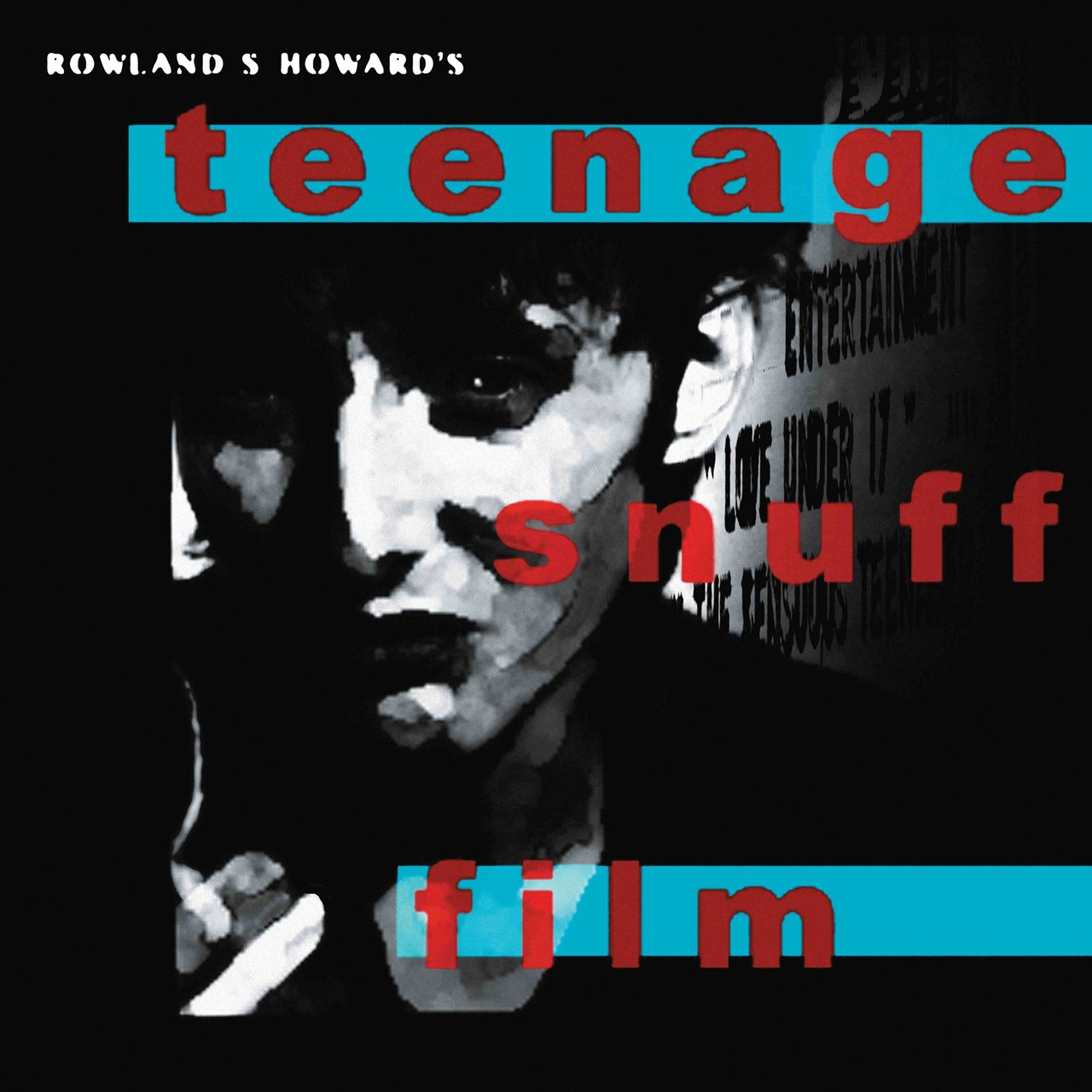
Mick Harvey
Mick Harvey is an Australian singer-songwriter and multi-instrumentalist. He was a founding member of The Boys Next Door, The Birthday Party and Nick Cave and the Bad Seeds. Harvey recorded both Teenage Snuff Film and Pop Crimes.
“In 1978 we didn’t know what Rowland was going to become in terms of his abilities as a musician. I knew of his potential as a songwriter. But with The Birthday Party he had to moderate what he was writing because Nick [Cave] was the singer. So he saw it was worth his while to focus on guitar playing. It was his way of being at the forefront, making a unique sound that was upfront and noticeable. He worked so hard and honed his craft to be like that. It was a set of very strong stylistic elements that have a homogeneity about them, all working together. He wasn’t interested in playing like anyone else. His opinions and ideas were really impactful on the band. He had great style and public presentation.
“He didn’t take it well when the band ended, and I understand why. Rowland became the scapegoat, tied in with Nick having difficulty with him about songwriting issues and accreditation on songs. When the band resumed as The Bad Seeds he felt left behind, like we just moved on and continued without him, which is not what we thought. Things like that could be handled better, but Nick is never good at handling those things. There was never any resolution. He never took it up with Nick, it was probably too hurtful.
“He wasn’t interested in playing like anyone else. His opinions and ideas were really impactful on the band. He had great style and public presentation” – Mick Harvey
“With his solo albums he found his niche. They are very individualistic, and were outside the normal spectrum of what people were doing. He had his drug issues, but recordings those albums I had a different experience. Making Teenage Snuff Film he wasn’t using at all, one of the reasons why it’s so focused and his singing is so good. When we did Pop Crimes he was so sick by then he couldn’t use heroin anyway.
“He didn’t change that much through the years. He was always very earnest about his art, very into music and the spirit of rock and roll and its rebellious potential. He had his own eccentric nature. The main thing he developed was some level of being embittered about stuff that had happened, and his lack of success. But his ability to be present to build a fanbase just wasn’t there.
“The work he did do has survived and stands up really well. He saw with Pop Crimes that people were interested. It would have suited him very well being a pop star, actually. That would have elevated his attitude. He always felt like he had something important to offer and would have loved that people were responding to it. That’s what he always wanted.”
Thurston Moore
Thurston Moore is founder of Sonic Youth and Thurston Moore Group with Deb Googe, James Sedwards, Steve Shelley and Jon Leidecker aka DJ Wobbly. Thurston Moore Group have just joined Bandcamp to release lost singles.
“I met Rowland when I first saw The Birthday Party in New York. They’d really burned out coming to the States, so the show wasn’t transcendent, but it was interesting seeing them sweating up a storm, these bedraggled droids with big hair and stinking clothes. We became very friendly when Sonic Youth supported Nick Cave and the Bad Seeds in the UK in 1985 (Howard joined the Bad Seeds as touring guitarist for one UK tour). We got talking about things we had interest in, mostly cyberpunk writers like William Gibson. We became pen pals, just postcard-style correspondence about science fiction books and what we were up to.
“Sonic Youth did a few tours with These Immortal Souls, so we spent a lot of time together and became familial. When Sonic Youth did Australia and he’d relocated to Melbourne he’d come and see us play, we’d go record shopping, have lunch. He had a dry sense of humour, very cutting. He didn’t suffer fools. When he arrived at the gig he’d ask somebody working at the venue about sound check and if he didn’t get a straight answer he’d get very testy. Those guys from Melbourne, the upper-middle class school boys, they were toughies in their own way. I could see Rowland getting into people’s faces if he had to.
“He was so significant to a lot of the underground American music coming from the initial hardcore scene. I told him once, but I don’t think he appreciated what I was on about” – Thurston Moore
“He was one of the most idiosyncratic guitar players I’d ever seen. To play like that where he could physically manifest what he was playing – it was a spindly, sharp sound played by this spindly, sharp gentleman stumbling about the stage in a focused way, looking beautiful. He was so significant to a lot of the underground American music coming from the initial hardcore scene. I told him once, but I don’t think he appreciated what I was on about.
“I remember him as a complete sweetheart who had very singular style that is unlike anyone else. He was one of those artists you never felt like he was doing anything except for his own creation. That’s rare to hear in musicians. The last time I was in Australia I went to visit the street named after him and took a picture under the sign.”
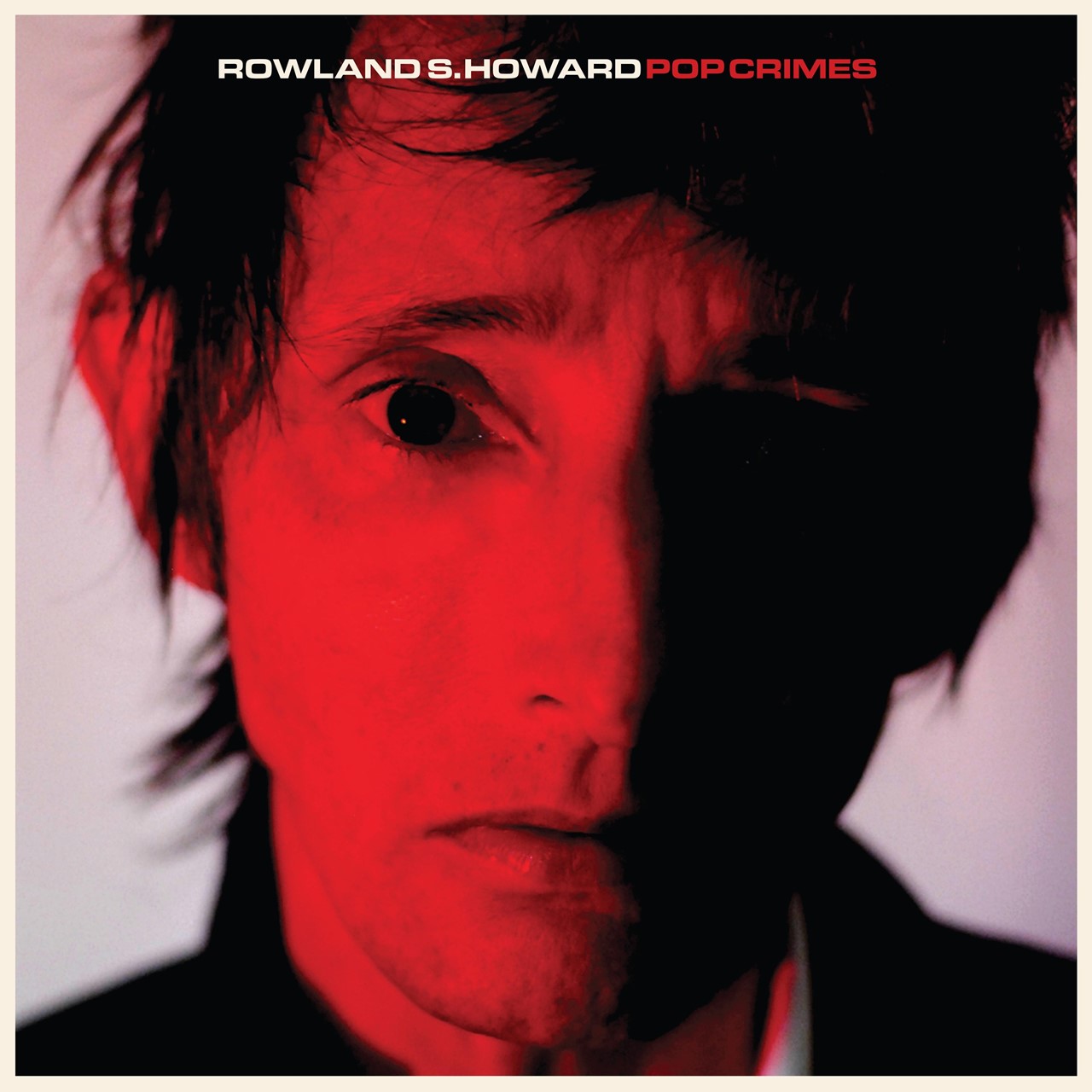
Barry Adamson
Barry Adamson is a Mercury-nominated solo artist and former member of Magazine and Nick Cave and the Bad Seeds. Adamson played on The Birthday Party’s final album Junkyard.
“When I first heard Mr Clarinet by The Birthday Party I was totally blown away. Right at the end of the record everything disintegrated into the most incredible sound I’d ever heard coming out of a guitar. I just thought ‘wow’. I really got an ear onto Rowland being something quite special in a world where guitars were just guitars. He had this other thing.
“I got to know them in London and we’d hang out at someone’s house and get slaughtered [laughs]. I found Rowland a fascinating character, the man with the longest cigarette ash in the world. And always with his trouser press! He had to look sharp as anything, with his little polka-dot cravat. He was barely able to put himself together, but he looked great in those clothes.
“Sweet is an odd word to use, but underneath the bravado and drug-fuelled hardened image he was a vulnerable man. You could read every mood on his face, there was this hypersensitivity going on” – Barry Adamson
“Sweet is an odd word to use, but underneath the bravado and drug-fuelled hardened image he was a vulnerable man. You could read every mood on his face, there was this hypersensitivity going on. I remember a kind of a jar between me and Nick in the studio once and Rowland said ‘I know, it’s not very nice when Nick decides he’s not your friend anymore’. I knew he was talking about himself, I could see his anguish. He knew possibly even then something was starting to slide away from him.
“He was beautiful with me. He played a track on my album Moss Side Story and changed the landscape of the whole piece. He said I should call it Glittering Blaze, which I guess was a comment on his sense of self and also an ode to violence. He had this very small amp, and stood three inches away making it do things that were just unheard of, you shouldn’t be able to do.
“I feel a warmth towards him whenever his name is mentioned. It’s really sad he went the way of ill health and death, it was too soon. There should have been a massive audience there, he shouldn’t have been playing to 1,000, he should have played to 10,000. Because that guitar is so splendid. Just strumming one chord you know it’s Rowland Howard. It’s the same six strings. Why is it so different when it was him? Because he was as unique as anything.”
Lydia Lunch
Lydia Lunch is an American singer, poet, writer and spoken word performer. Lunch collaborated with Howard on a cover of Some Velvet Morning in 1982, and the 1991 album Shotgun Wedding. Her podcast The Lydia Spin goes out every Friday.
“To this day early The Birthday Party are my favourite band. When they first played in New York I ran up to Rowland and pledged my devotion. He knew my work and immediately proposed covering Some Velvet Morning together. I knew very few people who knew Lee Hazlewood at that time so I was impressed. So I decided, that it’s – I’m running off to London to work with Rowland.
“I was very drawn to Rowland; he was the sound of a ghost. The first song we wrote was called I Fell in Love With a Ghost. I felt he wasn’t long for the world even when I first met him. We’re all born dying but in his case there was something so fragile about him. But there was something so magical too, and being quite witchy myself it made a good fit.
“He had a very good sense of humour which people don’t know about him. His music is dark and serious and elegant but he was very eloquent and very funny. He had a lot of misery – poverty, ill health, drug addiction and existential angst will do that. But he wasn’t a miserable person. And he loved women. He had a very feminine side. He was extremely romantic, and his music is extremely romantic. It’s gothic. It’s like an Edgar Allen Poe story come to the stage.
“He had a very good sense of humour which people don’t know about him. His music is dark and serious and elegant but he was very eloquent and very funny” – Lydia Lunch
“He went onto to do many great projects after The Birthday Party. He didn’t produce that much, but every note he produced was a necessary elemental. I compare it Hubert Selby – it wasn’t how many books he wrote, it’s what those books were. It’s how I feel about Rowland.
“He wasn’t in great shape by the time I brought him to New Orleans to make Shotgun Wedding. But I wasn’t looking at the loss or the lack, I was looking at the beauty and the pure essence. I wasn’t looking at the rust on the Cadillac. He was still spunky, and it was a good experience for him. We made a great record and toured and had a great time.
“I went to Australia after Shotgun Wedding and he was in pretty sad shape but there was nothing I could do. But I can’t say I wish I had more time with him, because the time I did have was so fucking incredible. I cherish every day we spent together.”
The albums Teenage Snuff Film and Pop Crimes by Rowland S Howard are out now, reissued by Mute Records.
Waves of ANZAC / The Journey, Mick Harvey’s first soundtrack release in over ten years, is out now too, via Mute Records.
